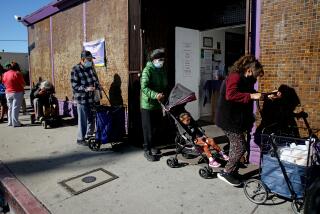Parent-Child Classes Bring Hope to Blythe
- Share via
As they head into the final stretch of a three-year, $1-million federally funded effort to reduce violence and stem substance abuse on a notorious stretch of Blythe Street, officials with the San Fernando Valley Partnership say they are laying the groundwork for positive long-term change in the area.
This week, the most recent group of parents and children to take part in the partnership’s Blythe Street Prevention Program graduated from the 10-week course, which offers instruction on topics ranging from gangs and alcohol abuse to nutrition and cultural tolerance.
“In this generation there are so many stressful life situations that kids have to deal with,” said Norma Rosen, director of the prevention program. “We have found that you have to reach them at the youngest age possible. We’re filling in gaps in services that weren’t there before and that aren’t available in other poor communities.”
Since fall 1995, almost 200 Blythe Street parents and children 9 to 14 have graduated from the program, which is designed to steer youths away from the types of behavior that made Blythe one of the Valley’s most dangerous streets in the late 1980s and early 1990s.
“[There’s] enough of a sample now to say things with a degree of reliability, and the results have been very impressive,” said Richard Cervantes, a researcher hired by the partnership to evaluate data compiled during the past 2 1/2 years. “I do a lot of this stuff, and it’s rare to see these significant changes.”
Most notably, Cervantes said, the partnership has taught parents skills they need to intervene when their children appear to be drifting toward gang affiliation or substance abuse. In addition, the children involved in the program have improved in school and learned to resolve problems without resorting to violence, Cervantes said.
The prevention program also includes tutoring, referrals, a teenage youth group and a variety of after-school and weekend recreational activities.
It is funded by the Center for Substance Abuse Project, a division of the federal Department of Health and Human Services.
More to Read
Sign up for Essential California
The most important California stories and recommendations in your inbox every morning.
You may occasionally receive promotional content from the Los Angeles Times.













